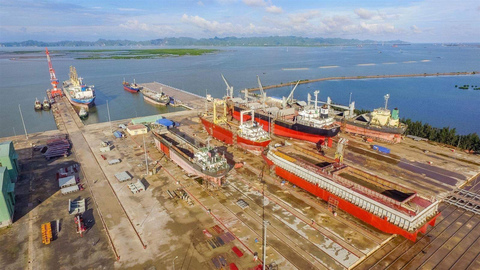
Ships are being built at the Nosco – Vinalines Ship Repair Plant in the northern province of Quanng Ninh. Viet Nam's container fleet grows from 19 ships in 2013 to 39 in 2019. VNA/VNS Photo Trung Nguyen
Viet Nams sea transport sector has maintained good growth recently with the volume of goods transported by the Vietnamese fleet reaching more than 81 million tonnes in the first half of 2019, a year-on-year increase of 16 per cent.
According to the Viet Nam Maritime Administration (VMA), the structure of Viet Nam's shipping fleet is developing towards specialisation, with the container fleet growing from 19 ships in 2013 to 39 in 2019. Additionally, Viet Nams average fleet age is 15.6, 5.2 years younger than the global average of 20.8.
Statistics from the United Nations Conference on Trade and Development (UNCTAD) show the Vietnamese fleet ranks fourth in ASEAN and 30th in the world in terms of dead-weight tonnage.
On the management of river-sea compatible ships (VR-SB), a VMA representative said the policy of establishing a coastal transport route to relieve the burden on road transportation is justified.
However, according to VMAs deputy director Bui Thien Thu, the development plan for the inland ship fleet in 2015-20 only prioritised the development of VR-SB ships with a tonnage of up to 5,000 tonnes, but actually there are many newly built ships of capacities of over 20,000 tonnes.
Currently, there is no inland waterway port that can accommodate a vessel this size, so large VR-SB vessels only enter and exit the seaport to transport cargo, directly compete with the domestic fleet. This affects the development of the inland shipping fleet, as well as the shipbuilding industry and crew training, Thu added.
Therefore, the VMA plans to work with agencies to propose solutions to better manage VR-SB in accordance with international regulations and practices on safety and maritime security.
Statistics from VMA show that in the first half of this year, Viet Nams ports handled 308.8 million tonnes of goods, up 13 per cent compared to the same period in 2018. Notably, the volume of container cargo reached 9.1 million twenty-foot equivalent unit (TEUs), up 3 per cent year-on-year.
However, Viet Nam's shipping industry is still challenged by a dwindling fleet.
The number of ships has decreased from 1,600 in 2018 to 1,568 at present, with total capacity of about 4.8 million gross tonnage (GT) and total tonnage of 7.8 million deadweight tonnage (DWT).
Economists see this as a worrying figure because when the fleet declines strongly, the goal of meeting 100 per cent of domestic freight transport output will be difficult to achieve. — VNS